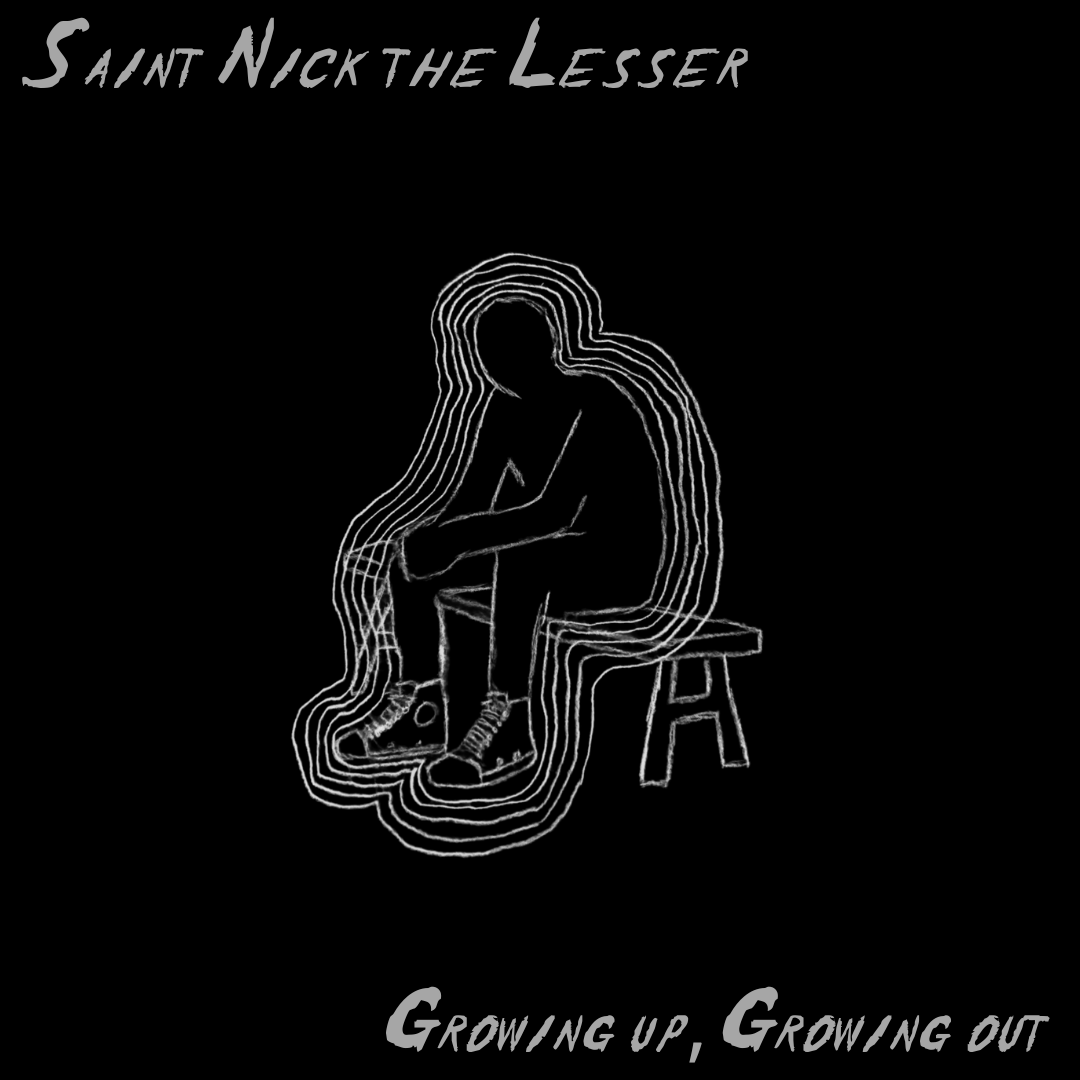Saint Nick the Lesser’s debut album, “Growing up, growing out,” arrives as a personal diary and a universal statement, a collection of songs that captures a decade’s worth of wrestling with identity, memory, and transformation. Officially launched in July 2025, the record feels like an arrival but also like a document of becoming, charting the jagged path of someone learning to let go, hold on, and move forward all at once. Produced by Ryan Jarvis and Rob Maile at Sivraj Studios in North Hollywood, the album carries the intimacy of long hours spent in a space that became a second home, complete with the quiet presence of Nimbus, the studio dog, who became an unlikely mascot of the process. What emerges is a sound rooted in punk, ska, and anti-folk traditions, yet softened by storytelling depth and melodic experimentation.
The album opens with 21 Minutes, a track that immediately sets the tone by introducing urgency, as if every second counts. There’s a restlessness here, the sound of someone cataloguing fleeting moments before they disappear. From there, Anne-Marie shifts into more reflective terrain, marrying lyrical intimacy with instrumentation that feels nostalgic and raw. By the time Catfish Bones kicks in, listeners are deep into the unpolished honesty of the record. This track in particular recalls the influence of Frank Turner or Laura Jane Grace—gritty, direct, and unwilling to sand down the edges of vulnerability. Each song feels less like a polished performance and more like an open window into the artist’s lived experience.
The emotional core of the album begins to expand with Cassandra and Thorazine. Cassandra, with its live strings, is one of the most poignant moments on the album; a track where the fragility of human connection is underscored by swelling arrangements that elevate its storytelling weight. In contrast, Thorazine takes a darker turn, channelling frustration and resignation into a bracing listen that reflects the harder side of growing out of one’s old self. Together, these songs highlight the album’s range: tenderness and rage, beauty and abrasion, each necessary to understand the broader journey of transformation.
At the midpoint, God Bless delivers a kind of weary acceptance. It’s a song that acknowledges contradictions—faith and doubt, hope and despair—and finds strength in simply naming them. This is followed by August in the Rain, one of the album’s most cinematic entries, drenched in imagery that speaks to nostalgia and transience. The rain becomes a metaphor for time’s passing, for the inevitability of change, and for the melancholy that shadows even our happiest memories. It’s in these moments that Saint Nick the Lesser leans fully into the poetic dimension of songwriting, proving that punk grit and lyrical nuance can live side by side.
Train Tracks and Amethyst continue to expand the album’s thematic reach. Train Tracks feels like an ode to impermanence, to the way our lives move along uncertain rails toward destinations unknown. Its stripped-down nature draws the listener close, as if overhearing a confession. Meanwhile, Amethyst, with its lush strings and layered arrangements, is one of the record’s most ambitious moments. It glimmers with a sense of rebirth, turning pain into beauty and chaos into clarity. These two tracks, though very different in scope, both circle back to the central theme of the album: growth as a process of constant change.
The closing track, The Tunnel, ties the album together with a sense of forward motion. It’s not a triumphant ending, nor a defeated one, but a recognition that life itself is a tunnel—sometimes dark, sometimes illuminated, always pushing us toward the unknown. The lyrics avoid easy resolution, but in doing so, they capture the essence of what “Growing up, growing out” is all about: the embrace of uncertainty, the acceptance of flux, and the courage to step into whatever comes next. Ending on this note feels deliberate, reminding listeners that growth is never final—it is always ongoing.

Lyrically, the album’s theme is remarkably consistent for a collection of songs written over such a long period. While not conceived as a concept album, it nevertheless carries a natural through-line: the tension between who we were and who we are becoming. Saint Nick the Lesser grapples with questions of individuation, regret, resilience, and self-acceptance, often in raw and unfiltered language that feels more journal entry than polished verse. There’s something disarming about this honesty, and it invites listeners to recognise their unfinished selves in the cracks and scars of these songs.
In the end, “Growing up, growing out” is a testament to survival, reinvention, and the messy beauty of becoming. Saint Nick the Lesser has created a record that resists neat categorisation, balancing punk urgency with folk vulnerability, and raw grit with moments of orchestral beauty. It’s an album that embodies the process of storytelling itself, full of fragments, contradictions, and revelations. For listeners navigating their uncertain paths, this record offers both a mirror and a companion, reminding us that to grow up is also, inevitably, to grow out of places, of versions of ourselves, and ultimately into something truer.
For more information, follow Saint Nick the Lesser:
Website – Spotify – Bandcamp – Soundcloud







